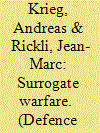| Srl | Item |
| 1 |
ID:
083056


|
|
|
|
|
| Publication |
2008.
|
| Summary/Abstract |
This article looks at the evolution of European small states' military policies after the Cold War. Traditionally, small states faced a security dilemma between favouring influence and guaranteeing sovereignty. These security options were embodied by the strategy of alliance and the policy of neutrality. This article argues that in today's unipolar world small states' security policy must be cooperative either in the form of joining a security institution or an ad hoc coalition. This has two consequences for small states' military policies. These can either favour niche or lead/framework nation strategies. This in turn, depends on the strategic ambitions of the small states, which are ultimately mediated by their strategic culture. This article concludes by looking at the military policies of Cold War neutral states after the Cold War
|
|
|
|
|
|
|
|
|
|
|
|
|
|
|
|
| 2 |
ID:
159186


|
|
|
|
|
| Summary/Abstract |
Airpower, drones and cyber-weapons are employed by states in conjunction with local armed non-state actors in an effort to coercively intervene in the crises of the twenty-first century. While the externalization of the burden of warfare is a return to pre-modern war, it is the change in the underlying socio-political relations between the state and its military agent that is a novel phenomenon in surrogate warfare. This article demonstrates that in a post-Westphalian era characterized by non-state violence, globalized conflicts, a prioritization of risk management in a mediatized environment, the state has to explore new ways to remain relevant as the primary communal security provider. Thereby, the organization of violence has departed from the employment of the state’s soldier as the primary bearer of the burden of warfare to a mode of war where technological and human surrogates enable the state to manage the risks of post-modern conflict remotely. In this article, we conceptually explore surrogate warfare as a socio-political phenomenon within the context of globalized, privatized, securitized and mediatized war.
|
|
|
|
|
|
|
|
|
|
|
|
|
|
|
|